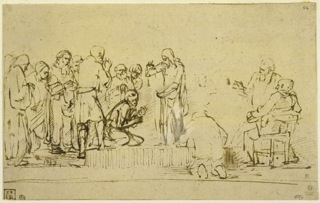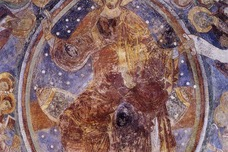Sunday Reflection with Fr Robin Gibbons - 28 April

Rembrandt pen drawing
Second Sunday after Easter - Also called Divine Mercy Sunday.
'But he (Thomas) said to them,
"Unless I see the mark of the nails in his hands
and put my finger into the nail marks
and put my hand into his side, I will not believe."(Jn 20:25)
There is a side of me, very much that of the old fashioned traditionalist who does not like the liturgical Sunday becoming associated with causes or days! Ministering in the Eastern Catholic Church, I am very aware how we use the Gospel reading of the day to describe the Sunday-as well as the technical term of Sunday after Pentecost or Lent or whatever, but all this has the advantage of keeping the memory of Sunday firmly as that of the resurrection, of being a special day and feast all on its own! In the case of the Sunday after Easter it is either known as the Octave or Antipascha, another Easter Day, facing Easter like a bookend.
But recent Roman Catholic tradition under JP II, added to the Octave of Easter the term 'Divine Mercy Sunday', based on the devotions and teaching of Saint Faustina to which the Pope himself was especially devoted!
Great as this devotion may be, it sits uneasily with the huge ancient and dare I put it, 'ecumenical' tradition of Holy Pascha, and the predominance of the resurrection celebration not only in the great Octave but throughout the whole 50 days of feasting, where joy is our calling and alleluia our song! So Eastern Catholics do NOT celebrate Divine Mercy Sunday, remaining firmly in the ancient tradition!
There is something to be said about getting back to that older strand of ecclesial faith-expressed in the great liturgical season of Pascha, keeping our focus on that immense gift of God-in-Christ, who has risen from the dead, trampling down death by death! Why? Because the resurrection of Christ from the dead matters, because at the heart of all our faith, that event is so crucial to what we profess ourselves to be as Christians! It is a much needed witness in the world where Christianity is now so openly persecuted more than ever, and in our so-called 'enlightened' countries where the slower martyrdom of ridicule and irrelevance places us all into a very uncomfortable position. We have of course been there before, all this is nothing new, take the Gospel story of Thomas, incredulity at the tales of Jesus' rising dominates the narrative, so much so, Thomas even says unequivocally: 'I will NOT believe'! This has happened throughout all our history, but like Thomas it never ends there, belief in Christ's resurrection crashes though our agnosticism in the most unlikely ways!
So, I for one may take on board Divine Mercy, but I will put it into the background and concentrate on the greater focus of Christ's resurrection appearances. The story of Thomas seems to me to be much more of a visual parable of the immediate mercy of Christ reaching out to an enquiring, inquisitive mind, a desperately important account of how the immediacy of Jesus is the antidote, how the encounter becomes the message. It is Christ who is raised, Christ who appears to Mary, Peter and Thomas amongst the others, and it is Christ who calls us to seek him, Christ who is our Morning Star, Everlasting Light, our way, our truth and our life. What we need to be doing first of all, is not confuse people by the secondary elements of faith, but help point them towards the primary focus, the alpha and omega, the living Christ!
It can happen, 'peace be with you' says Jesus to us, but this is a peace that can only be found in meeting him. Maybe we should pray that like John in his vision of Jesus, we become unafraid to encounter Christ in this way: "When I caught sight of him, I fell down at his feet as though dead. He touched me with his right hand and said, "Do not be afraid. I am the first and the last, the one who lives. Once I was dead, but now I am alive forever and ever. I hold the keys to death and the netherworld." (Rev 1.17:18)
Lectio Divina
Rowan Williams Talking about Thomas with Mark Vernon
RW When Jesus is about to go to Jerusalem with the disciples and they're a bit reluctant because they say 'they're gonna kill you', it's Thomas that says 'well alright, we all better go and killed then.' A sort of Eeyore character. And then again in the story of the Last Supper it's Thomas who when Jesus says 'You know the way I'm going?', says 'no, we don't.' (Chuckle)
So clearly there's a pattern emerging. This is a sceptic and the gospel says it's quite important that in the balance of personalities around Jesus there is somebody who asks the awkward questions who is not a kind of Pollyanna optimist and who eventually will only be convinced by the confrontation of a relationship. At the end of the day, in fact, he says 'I need to touch the risen body.' But when Jesus appears to him as a risen body, Thomas doesn't touch. He says 'now, I see enough.'
MV So although it seems he's looking for empirical evidence, that's different?
RW It's the encounter that finally makes the difference I think.
Thomas Merton on Faith and Doubt
New Seeds of Contemplation:
Let no one hope to find in contemplation an escape from conflict, from anguish or from doubt. On the contrary, the deep, inexpressible certitude of the contemplative experience awakens a tragic anguish and opens many questions in the depths of the heart like wounds that cannot stop bleeding. For every gain in deep certitude there is a corresponding growth of superficial "doubt." This doubt is by no means opposed to genuine faith, but it mercilessly examines and questions the spurious 'faith' of everyday life, the human faith which is nothing but the passive acceptance of conventional opinion.
Fr Robin is an Eastern Rite Catholic Chaplain for Melkites in the UK. He is also an Ecumenical Canon of Christ Church Cathedral, Oxford.


















